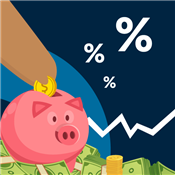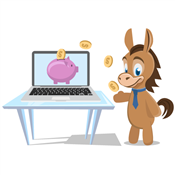Is a Savings Account Worth It?
Ad Disclosure: This article contains references to products from our partners. We may receive compensation if you apply or shop through links in our content. This compensation may impact how and where products appear on this site. You help support CreditDonkey by using our links.
With interest rates so low, what's the point of having a savings account? Find out the pros and cons of savings accounts, and why you may still want one.
 |
Interest rates on savings can't even keep up with inflation.[1]
So you may be wondering if you're better off investing your money instead of keeping it in a bank?
However, a savings account should still be an important part of your overall financial plan.
The purpose of a savings account is having a safe place to store money that you won't use right away. You won't be tempted to spend that money, but you still have access to it if you do need it.
Let's get into why you should have a savings account, as well as some things to watch out for.
5 Reasons Why You Need a Savings Account
 |
Here are the advantages of having a savings account.
1. Store Your Emergency Fund
A savings account is the best place for storing your emergency fund. You never know when something will happen. So it's important that you have money set aside if you suddenly need a roofing repair or your car breaks down.
In an emergency, you need to be able to get to your money right away. A savings account lets you withdraw funds at any time.
Most financial experts recommend that you have enough savings to cover three to six months' worth of living expenses. This way, if you unexpectedly lose your job, you have enough to live off of until you find a new one.
Without emergency savings, you may have to take on credit card debt, take out personal loans, or sell investments to get through the crisis. All that will snowball into more and more financial problems.
2. Save for Short-term Goals
If you're saving for short term goals within the next 3-5 years, it's best to keep them in a bank savings account instead of in stock investments.
While it's true that investing can give you higher returns, you also run the risk of losing money. The stock market is volatile, and it's normal for stock prices to fluctuate a lot. Stocks should be long-term investments for the best chance of success.
If you need the money within the next few years, you don't want any risk of your money losing value. A savings account is a completely risk-free way to store your money until you reach your savings goal.
Many banks will even let you set up multiple savings accounts. For example, you can have separate accounts for a house down payment, wedding, vacation, etc. This will let you track separate goals more easily.
3. Grow Your Money
Savings accounts offer interest to help grow your money. If you keep all your money in a checking account (or worse, in a box under your bed), then you're losing out on interest (even if it's not high).
You should only keep enough in checking to cover day-to-day spending money. Any extra cash you won't use immediately should go into savings to earn interest.
Usually, you'll find high-yield savings accounts at online banks. Online banks have less overhead, so they pass the savings on to customers in the form of higher interest rates.
4. Easily Accessible
Your money in a savings account is liquid. You can take it out anytime you need it. You can easily transfer money to your checking account or even withdraw funds with an ATM card.
Just remember that the federal law limits you to only 6 free transfers/withdrawals per month.[2] Savings accounts are meant to be for saving money, so you're not supposed to be always withdrawing money.
5. Your Money Is Protected
As long as you're using a legit bank or credit union, your money is protected.
The Federal Deposit Insurance Corporation (FDIC) protects your deposits up to $250,000 in case of bank failure. Similarly, the National Credit Union Administration (NCUA) insures your money held at credit unions up to the same amount.
3 Downsides of Savings Accounts
 |
Even though savings accounts should be a part of your personal finance plan, here are some downsides to watch out for.
1. Low Interest Rates
Unfortunately, banks don't offer much interest nowadays. Traditional brick-and-mortar banks offer so little interest that it's practically negligible. If you really want the best rate, go with an online high-yield savings account.
Interest rates can also change at any time. When the economy is struggling, the Federal Reserve will usually cut benchmark rates. And banks will follow and offer lower APYs. So the amazing rate you started with could go down significantly without warning.
2. Withdrawal Limit
As mentioned before, the Federal Reserve limits you to only 6 withdrawals and transfers every month. But this is not necessarily a bad thing. You're supposed to be saving money, after all.
Usually, withdrawals from ATMs and bank tellers are exempt. But electronic transfers, overdraft transfers, debit purchases, and wire transfers all count toward this limit.
3. Account Fees
Most traditional banks charge a monthly service fee for their savings accounts. You can waive the fee by keeping a certain minimum balance. Each bank will have their own requirements.
Make sure you're able to meet the minimum balance required. Otherwise, it doesn't make sense to be trying to save, and yet lose money to fees each month.
Online savings accounts usually don't have monthly service fees. They're a great option if you're OK with completely digital banking.
Alternatives to a Regular Savings Account
Here are some other different types of savings account options:
- Certificate of Deposit
Certificates of Deposit (CDs) require you to deposit a fixed amount of money for a fixed amount of time. You get a fixed interest rate for the duration of the term. The benefit of this is even if the economy is in a downturn and interest rates go down, your rate stays the same.But CDs have 2 downsides. You cannot add more funds once it's opened. And your money is not liquid. You must keep your funds there until maturity, or you'll face penalties for withdrawing early.
CD: Certificate of Deposit
- 4.70% APY for 12-month term
- 4.40% APY for 18-month term
- 3.75% APY for 36-month term
- 3.75% APY for 5-year term
- Roth IRA
A Roth IRA is a special retirement account with tax advantages. A unique thing about it is that you can withdraw your contributions at any time without penalties.This means that a Roth IRA could double as an emergency fund if you're really in a pinch. But this should only be used as a back-up, because it'll impact your retirement savings.
You're only allowed to contribute up to $6,000 per year in a Roth IRA. On the other hand, a savings account has no limit.
- Money market account
A money market account is like a mix of savings and checking accounts. You're still only allowed to withdraw 6 times a month, but you get a little more flexibility and easier access to your money.Many money market accounts allow for check writing and online bill pay (which is not allowed in a traditional savings account). Some even come with a debit card you can use for purchases and ATM withdrawals.
- Cash management account
This is a special type of account offered by brokerage firms. It's a good option if you would like to keep your savings and investments under the same roof. Another benefit is that brokerages typically don't have account balance requirements or pose withdrawal limits.
How Much Money Should You Keep in Savings?
At the bare minimum, we recommend that you have 3 months' of expenses in your savings account.
If you do lose your job, you'll likely give up "fun" things like eating out, gym membership, and shopping. So only include your "musts," like rent, bills, basic food, healthcare, etc. Figure out what that is each month, and aim to save 3x the amount.
After you have saved this amount, then you can start saving for other goals and investing. But at the same time, continue to contribute to your emergency fund until you reach 6 months' worth of expenses.
But don't keep too much money in a savings account either. If you have additional cash beyond an emergency fund and short-term goals, it's best to invest them for more returns.
Bottom Line: Are Savings Account Worth It?
The short answer is yes. Despite low interest rates, savings accounts are a crucial part of your personal finance plan. At the very least, everyone should have a savings account for emergency funds.
A savings account is a risk-free way to park money that you don't need in the immediate future. You're not meant to build wealth from a saving account. You do sacrifice some returns, but in exchange, you get security and easy access whenever you need your money.
References
- ^ FDIC, Current Average Rates
- ^ Federal Reserve Board, Regulation D
Anna G is a research director at CreditDonkey, a bank comparison and reviews website. Write to Anna G at feedback@creditdonkey.com. Follow us on Twitter and Facebook for our latest posts.
Note: This website is made possible through financial relationships with some of the products and services mentioned on this site. We may receive compensation if you shop through links in our content. You do not have to use our links, but you help support CreditDonkey if you do.
|
|
|










